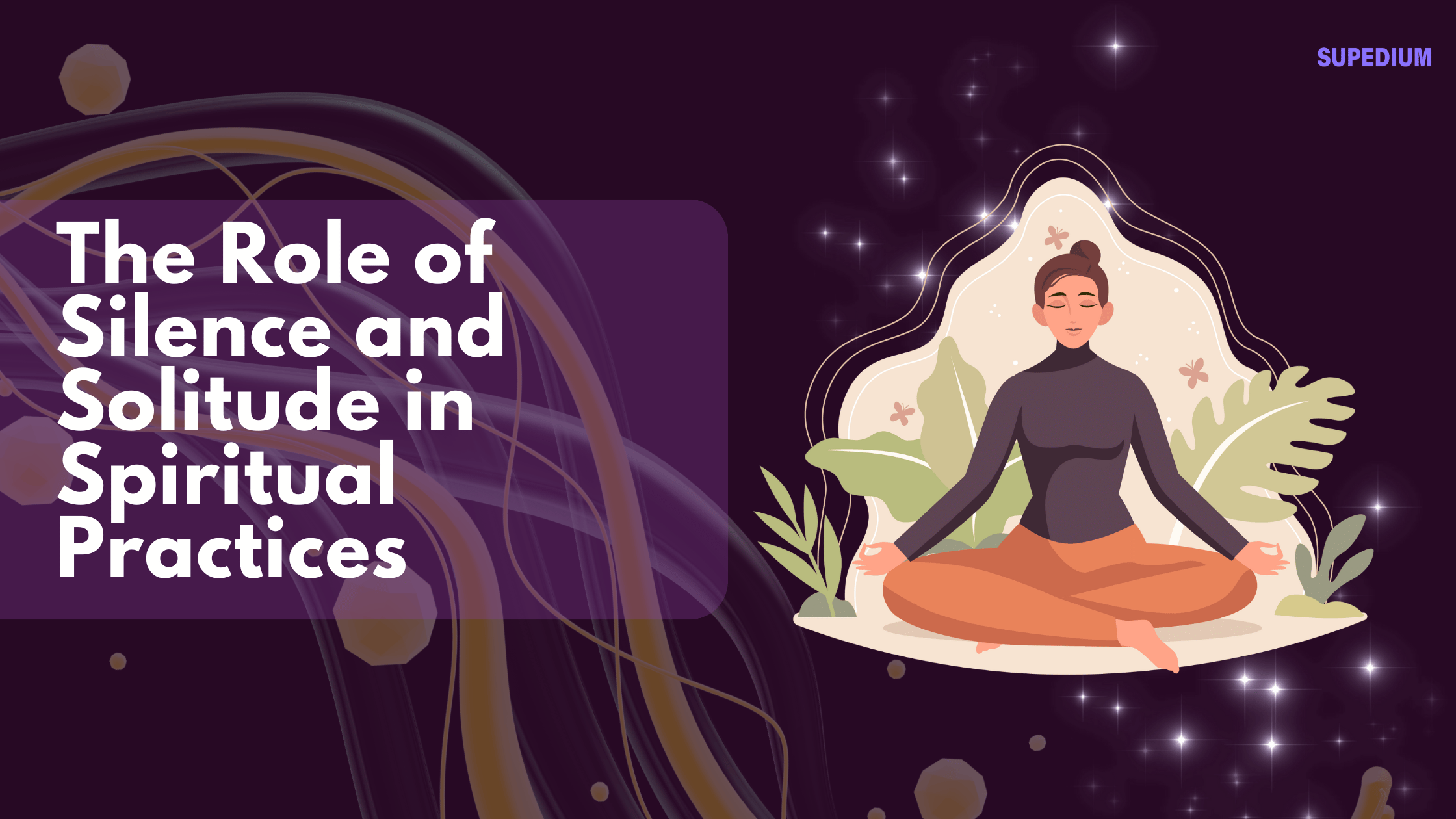Table of Contents
![]()
Introduction
Silence and solitude, though often undervalued in our bustling, hyper-connected world, play pivotal roles in spiritual practices across various traditions. Silence is not merely the absence of noise but a state conducive to deeper reflection and connection. Solitude, on the other hand, refers to the intentional act of being alone, free from external distractions. Both concepts are intertwined in their ability to foster spiritual growth, self-discovery, and a deeper understanding of the divine.
Historical Perspectives
Ancient Traditions
In many ancient spiritual traditions, silence and solitude were not just practices but essential aspects of spiritual life.
- Buddhism: In Buddhism, meditation retreats often emphasize silence and solitude to deepen one’s practice. Siddhartha Gautama, the Buddha, is renowned for his period of intense meditation under the Bodhi tree, which exemplifies the transformative power of solitude. During retreats, practitioners engage in extended periods of silence, allowing them to explore their inner landscapes and attain greater insight.
- Christianity: The Desert Fathers and Mothers, early Christian monastics, sought solitude in the Egyptian desert to escape worldly distractions and cultivate a closer relationship with God. Their lives in isolation were marked by prayer, contemplation, and ascetic practices. The monastic traditions that followed, including those of the Benedictines and Trappists, continued to value silence and solitude as pathways to spiritual depth.
- Hinduism: In Hindu traditions, silence and solitude are integral to practices such as yoga and meditation. Figures like Patanjali and various sages advocated for periods of retreat into nature or secluded spaces to achieve spiritual clarity and union with the divine. Hermits and ascetics in Hinduism often sought solitude to transcend worldly attachments and focus on spiritual practices.
- Indigenous Traditions: Indigenous cultures often incorporate periods of solitude into their spiritual practices. Vision quests, which involve solitary journeys into nature, are used to seek guidance, wisdom, and connection with spiritual forces. These practices underscore the importance of solitude in understanding one’s place in the cosmos.
Philosophical Underpinnings
- Greek Philosophy: Greek philosophers like Epictetus and the Stoics valued silence and self-reflection as tools for personal growth and emotional resilience. Stoicism, in particular, emphasized the importance of inner tranquility and the role of self-examination in achieving a virtuous life.
- Eastern Philosophies: Taoism, a key Eastern philosophy, holds silence as a fundamental principle. The Tao Te Ching speaks of the value of quietude and stillness in understanding the Tao, or the fundamental nature of the universe. Confucianism also recognizes the importance of solitude for self-cultivation and reflection.
Psychological and Emotional Benefits
Inner Peace and Clarity
Silence and solitude offer a reprieve from the constant noise of modern life, which can lead to mental clutter and stress. Engaging in periods of quiet allows individuals to clear their minds, enhance their focus, and practice mindfulness. This mental clarity can facilitate a deeper understanding of oneself and one’s surroundings.
Self-Reflection and Growth
Being alone in silence provides a space for introspection and self-discovery. This environment can foster personal insights and facilitate emotional healing. By confronting one’s thoughts and feelings without external distractions, individuals can engage in meaningful self-reflection, leading to personal growth and emotional regulation.
Stress Reduction
The physiological impact of silence and solitude on stress is significant. Research has shown that quiet environments can reduce cortisol levels and promote relaxation. Solitude offers a chance to step away from daily stressors and develop coping mechanisms, contributing to overall resilience.
Spiritual Dimensions
Deepening Connection with the Divine
In many spiritual traditions, silence and solitude are seen as pathways to a deeper connection with the divine. These practices create a space for individuals to experience transcendent moments and develop a more intimate relationship with their spiritual beliefs or deities.
Enhancing Spiritual Practices
Silence and solitude can greatly enhance practices such as meditation and contemplative prayer. These practices often require a quiet environment to facilitate a deeper connection with inner spiritual experiences. In solitude, individuals can develop their intuition and inner guidance, which are crucial for spiritual growth.
Solitude as a Path to Enlightenment
For many spiritual leaders and mystics, solitude is a key component of the path to enlightenment. Figures such as St. John of the Cross and the Buddha demonstrated that periods of isolation could lead to profound spiritual insights and enlightenment. Solitude allows for an unfiltered experience of spiritual awakening and deepened awareness.
Modern Applications and Practices
Retreats and Silence Practices
Modern spiritual retreats often incorporate extended periods of silence as a central component. These retreats, such as Vipassana meditation retreats or Ignatian retreats, provide structured environments for participants to immerse themselves in silence and solitude. Such settings help individuals disconnect from their everyday lives and focus on their spiritual practices.
Daily Practices
Incorporating silence into daily routines can be highly beneficial. Simple practices, such as mindful moments of quiet or dedicated periods of solitude, can enhance mindfulness and self-awareness in everyday life. Creating regular space for these practices can lead to long-term spiritual and psychological benefits.
Technology and Silence
In an era dominated by constant connectivity, the concept of a digital detox—intentional breaks from technology—has gained popularity. Balancing technological engagement with periods of silence and solitude can help mitigate the overstimulation and stress associated with constant digital interactions.
Challenges and Considerations
Overcoming Discomfort
While silence and solitude offer many benefits, they can also be challenging. The initial discomfort associated with being alone or quiet can be a barrier. Strategies for easing into these practices include starting with shorter periods and gradually increasing the duration as comfort grows.
The Risk of Isolation
It is essential to differentiate between healthy solitude and unhealthy isolation. While solitude can be beneficial, prolonged isolation can lead to feelings of loneliness and disconnection. Maintaining social connections and support systems is crucial for overall well-being.
Cultural and Societal Influences
Attitudes towards solitude can vary significantly across cultures. Some societies may view solitude as a negative state, while others may see it as an essential part of spiritual and personal development. Understanding these cultural perspectives can help individuals navigate their own practices more effectively.
Conclusion
Silence and solitude hold profound significance in spiritual practices, offering pathways to inner peace, self-discovery, and a deeper connection with the divine. Historical traditions, psychological benefits, and modern applications all highlight the importance of these practices in fostering spiritual growth. By embracing periods of silence and solitude, individuals can enhance their spiritual practices, achieve greater clarity, and cultivate a more profound understanding of themselves and the world around them.
Share This





Be the first to comment